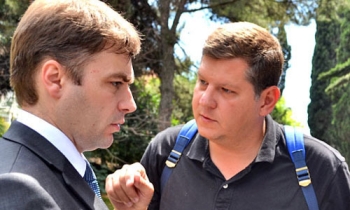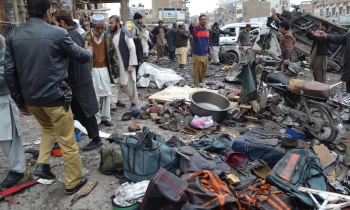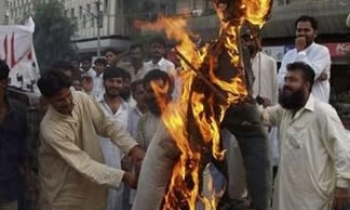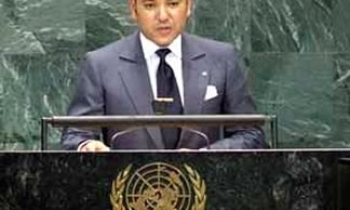Mohamed Alayyan could easily pass for one of his employees at ATV, the new terrestrial television station he plans to launch in Jordan later this year. Dressed in casual shirt and trousers, the 33-year-old looks more like one of his bright young employees rushing about planning programmes and schedules than the boss and owner.
While many of his fellow entrepreneurs in the west are vying to create the next great internet business, Mr Alayyan has established his credentials through "old" media such as newspapers and radio, which are still considered risky sectors in the Arab world. "In Arabic script, a single dot separates the words for adventure and gambling. I'm risking a lot with ATV, risking my name, which is probably my most valued asset," says Mr Alayyan.
ATV will be the first commercial television station in Jordan, a predominantly Muslim, conservative state surrounded by neighbours such as Iraq, Syria, Israel and the Palestinians. "Media is perceived as a troublesome sector in the Arab world. Most of the big television stations in the region are either supported by governments or not really based on financial viability."
Mr Alayyan is driven first and foremost by the bottom line, rather than politics or ideology. He believes the Jordanian advertising market will justify his $20m investment in ATV just as it has supported his previous ventures.
A scion of a wealthy Jordanian family, Mr Alayyan studied economics and accounting in England, then worked for his father's business empire, which included interests in insurance, cars, food and retail companies. But he rejected the easy option of a role in the family enterprise. "I wanted to learn and risk failure on my own."
Interested in advertising and marketing, he spotted a gap in the Jordanian market for a publication dedicated to classified advertisements. His hunch was reinforced by six months of research into the market and how a distribution system might work.
In 1999, he launched the classified weekly Al Waseed (meaning "connection" in Arabic) with $200,000 in funding from the family business. The classified ads are paid for but the paper is distributed for free. For the first time in Jordan, a free publication was delivered directly to people's homes by the company's paper boys. Previously, only publications paid for by subscription were home-delivered. "The level of income in Jordan is very low and I knew Al Waseed would not work if people had to pay a cover price," says Mr Alayyan.
Al Waseed now runs to as many as 140 pages of advertisements, all classified and commercial ads. There are plans to extend its distribution beyond Amman and the northern Irbid region to other cities. Mr Alayyan is coy about profits but says it is a "multimillion-dollar business". The paper's success also got him thinking about Jordan's ripeness for other media projects. "It grew exponentially and I asked myself, why is this happening in Jordan? Why is it that a weekly newspaper is getting more revenues than some of the dailies?," he says.
He commissioned a study of the daily newspaper market. This found that the majority of newspapers, all with varying levels of government ownership, made profits in spite of low circulation because there were virtually no alternatives for advertisers. "My conclusion was to launch an independent, daily newspaper based on subscription delivery and at the same time really focus on its independence and on professional journalism."
He launched Al Ghad in 2004 with funding of $10m, a mix of his own money and further help from the family business. It quickly became the second-highest circulation newspaper, selling about 55,000 copies a day in a country of 7m people.
Some Jordanians have been disappointed that Al Ghad (meaning "the future" in Arabic) has not pushed journalistic boundaries further. Part of the reason could be limits on press freedom imposed by the state and the all-pervasive security services. While the Jordanian media enjoy greater latitude than some of their Arab neighbours, criticism of the Hashemite ruling family is out of bounds, as is any serious questioning of foreign policy. "There is no harsh repression but there are red lines and if people forget what they are, it's easy to remind them with a phone call or a summons, which brings about very effective self-censorship," says Joost Hiltermann, Middle East project director for the International Crisis Group, who is based in Amman, the Jordanian capital.
Perceptions of journalism as a lowly profession in Jordan also made it hard for Mr Alayyan to find experienced personnel, and eventually prompted him to start his own training programmes at Al Ghad. Just as hard to overcome can be attitudes among journalists in a country where emotions against the US and Israel run high.
Meanwhile, Mr Alayyan saw a chance to extend his empire into television. "Media expenditure in Jordan is as follows: 85 per cent in the press, 5-10 per cent on TV and the rest is billboards and radio," he says. "I saw a window of opportunity to come in and have the first independent TV station, targeting Jordanian companies in trying to get some of that 85 per cent of a total $220m advertising market."
ATV will be a news and entertainment channel and the only local competition is state-owned JTV, considered dull by most Jordanians. Mr Alayyan says viewers only tune in to CNN or Al Jazeera for short, five-minute slots and that local news and content is the key to capturing their attention for longer periods.
Mr Alayyan has not been afraid to embrace the international trend towards reality TV in formulating programme ideas for ATV. "Some 70 per cent of Jordanians are below the age of 30 and we need to target them," says Mr Alayyan. His next challenge, along with preparing for ATV's launch within the next couple of months, is taking the company public. Options include a listing on the Amman stock exchange to raise up to JD40m ($56.5m) or issuing shares and options to employees, who number almost 1,000 across his newspaper and television group.









